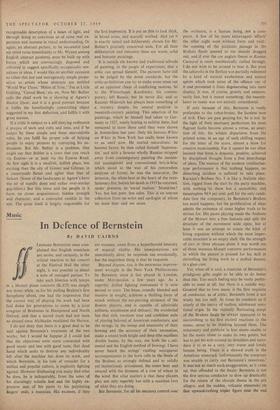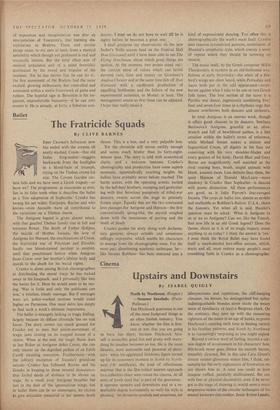Music
In Defence of Bernstein
By DAVID CAIRNS
I do not deny that there is a great deal to be said against Bernstein's treatment of the two works; but I would be happier if I could feel that the objections were more concerned with good music and less with good taste, that dead hand which seeks to destroy any individuality left after the machine has done its work, and which Bernstein, in his role of crusader for a unified and popular culture, is explicitly fighting against. However displeasing you many find what he does, he is indisputably, from the soles of his alarmingly volatile feet and the highly ex- pressive seat of his pants to his palpitating fingers' ends, a musician. His excesses, if they are excesses, come from a hyperthyroid intensity of musical vitality. His interpretations are neurotically alive; he responds too emotionally, but the important thing is that he responds.
Beyond dispute, too, is the enormous improve- ment wrought in the New York Philharmonic by Bernstein since it last played in London, under Mitropoulos, a few years ago. As a superbly drilled fighting instrument it is now second to none. The brass, roundly blended and massive in weight, achieves a thrilling force of attack without the ear-piercing stridency of the Boston players, and is capable of admirable softness, nimbleness and delicacy; the woodwind has that rich, resonant tone and confident style of playing beloved of American conductors; and the strings, by the sweep and unanimity of their bowing and the accuracy of their intonation, make a sound both bright and deep (the excellent double basses, by the way, use both the e,nti- nental and the English method of bowing). I have never heard the strings' rustling semiquaver accompaniment to the horn calls in the finale of the Brahms so strongly defined and so solidly yet mysteriously articulated; the notes bent and swayed with the firmness of a row of wheat in the wind. But what matters is that these players play not only superbly but with a manifest love of what they are doing.
But Bernstein, for all his uncanny control over the orchestra, is a human being, not a coin- putor. A few of his more extravagant 'effects' the other night were without form and void : the opening of the pizzicato passage in the Brahms finale seemed to me inanely dragged out; and if ever the cor anglais theme in Roman Carnaval is more mechanically rattled through, I do not wish to be around to hear it. But even the saltarello in the Berlioz was partially redeemed by a kind of natural exuberance and animal spirits which took some of the offence out of it and prevented it from degenerating into mere display. It was, of course, grossly and unneces- sarily fast, but it meant something; the resemb- lance to music was not entirely coincidental.
If only because of this, Bernstein- is vastly preferable to the robot-brains, the faceless men of hi-fi. They are past praying for, he is not. In the light of their mortuary perfections his most flagrant faults become almost a virtue, an asser- tion of life; his wildest departures from the printed notes, in an age of such chilling respect for the letter of the score, almost a blow for creative musicianship. For it cannot be too often insisted that form is dynamic, positive, achieved by disciplined thought from a free interchange of ideas. The essence of the modern totalitarian- type performance is that nothing happens, no disturbing incident is suffered to take place; Karajan's Brahms No. 1 is like a Stalinist elec- tion, rigged from the start by the party machine, with nothing to show but a monolithic and meaningless 98.9 per cent. poll for the only candi- date (not the composer). In Bernstein's Brahms too much happens; but the proliferation of ideas admits the existence of some higher truth to be striven for. His piano playing made the Andante of the Mozart into a free fantasia and split the structure of the movement wide open; but at least it was an attempt to create the kind of living organism without which the most impec- cable structure is an empty shell. On the strength of two or three phrases alone it was worth ten of those museum-Mozart concerto performances in which the pianist is praised for his skill in shrivelling the living work to a stuffed dummy in a glass case.
Yet, when all is said, a musician of•Bernstein's prodigious gifts ought to be able to do better than this. Too much feeling may be vastly prefer- able to none at all; but there is a middle way. Granted that to love music is the first requisite of conductor, as of critic; Bernstein loves it not wisely but too well. At times he conducts as if utterly at the mercy of restless, adolescent emo- tional urges. In the violently fluctuating tempi of the Brahms finale he always appeared to be succumbing to his first excited reactions to the music, never to be thinking beyond them. The missionary and publicist in him seems unable to let the music alone to make its own points, but has to put his arm around its shoulders and intro- duce it to us as a very, very warm and lovely human being. There is a shrewd truth in the American wisecrack 'unfortunately the composer was unable to carry out Bernstein's intentions.' It was not so much each exaggeration, as it came up, that offended in the finale; Bernstein is not the first serious conductor to slow up drastically for the return of the chorale theme in the pill allegro; and the sudden, volcanic crescendo on that upward-rushing triplet figure near the end
of 'exposition and recapitulation was also an interpolation of Toscanini's, that burning dis- ciplinarian in Brahms. These and similar things came, to my ears at least, from a musical sensibility which though not profound is real and unusually intense. But the total effect was of musical unbalance and of a mind feverishly dominated by the mood and impulse of the moment. Yet he has shown that he can do it : the first movement of the Brahms had the same exalted, glowing enthusiasm, but controlled and contained within a stable framework of pulse and rubato. The hopeful sign in Bernstein is his im- patient, unpredictable humanity—if he can only master it. He is already, at forty, a fabulous con- doctor; I trust we do not have to wait till he is eighty before he becomes a great one..
I shall postpone my observations on the new Sadler's Wells season (and on the Festival Hall Don Giovanni) until I have been able to see The Flying Dutchman, about which great things are spoken. At the moment, two points stand out: the curious sense of values which can lavish devoted care, time and money on Giordano's Andrea Chenier and at the same time fob off Don Giovanni with a cardboard production of appalling feebleness; and the failure of the new experimental acoustics, in Mozart at least. The management assure us that these can be adjusted. I hope they really mean it.







































 Previous page
Previous page